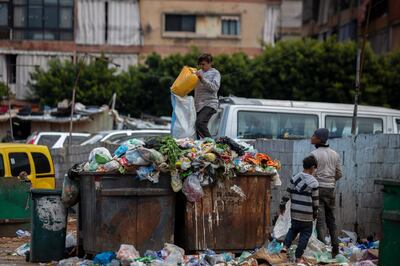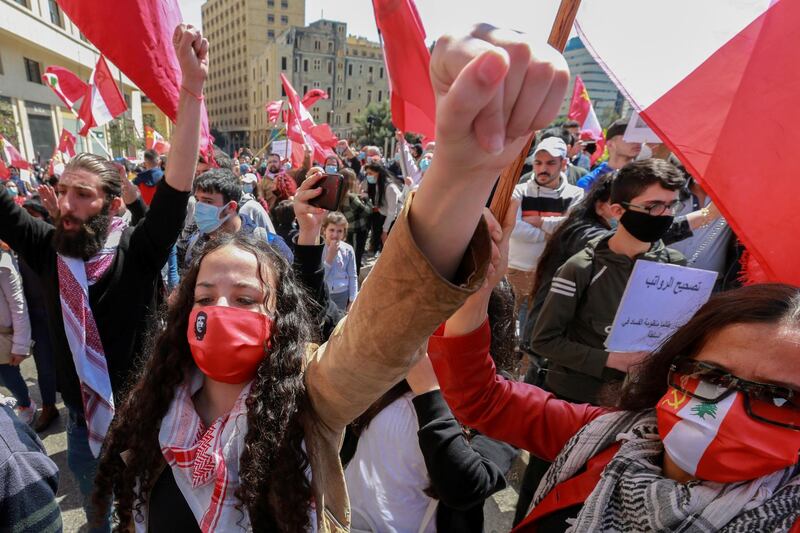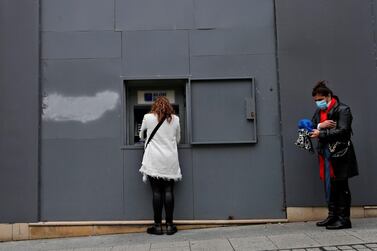Inflation in Lebanon soared an annual 155.4 per cent in February as the country battles its worst economic crisis in decades and endures a deadlock over the formation of a government that needs to carry out reforms to unlock billions of dollars of aid from the International Monetary Fund and donors.
This is the eighth consecutive triple-digit increase of the Central Administration of Statistics' Consumer Price Index since July 2020. The index increased 4.46 per cent from January 2021. Although inflation has spiked, it is still far from the peak of 741 per cent reached at the end of 1987 during the country's 1975-1990 civil war.
"The surge in inflation is due in part to the inability of authorities to monitor and contain prices, as well as to the deterioration of the exchange rate on the parallel market, which has encouraged some opportunistic wholesalers and retailers to raise the prices of consumer goods disproportionately," Nassib Ghobril, the chief economist of Byblos Bank, , told The National.
Lebanon's currency has been in free fall and lost as much as 90 per cent of its value against the US dollar in the black market. In mid-March, it reached as much as 15,000 pounds to the greenback before receding to 12,000 pounds last week. Before the onset of the crisis, the pound, or lira, was pegged at 1,507 to the dollar.
"The lack of political will to modify the subsidies mechanism has also resulted in massive smuggling of subsidised goods across the border instead of their availability in the local market as intended. This created scarcity of these goods locally," Mr Ghobril added.

Prices at restaurants and hotels surged 618 per cent in February 2021, followed by clothing and footwear (612 per cent), furnishings and household equipment (609 per cent), food and non-alcoholic beverages (417 per cent), alcoholic beverages and tobacco (388 per cent), miscellaneous goods and services (329 per cent) and transportation (229 per cent). Recreation and entertainment swelled by 225 per cent and communication increased 106 per cent.
Lebanon's economy contracted 25 per cent last year and 6.7 per cent in 2019. The IMF did not provide projections in its World Economic Outlook for Lebanon when it released its report last week given the fluid situation in the country.
The country's economic woes have been exacerbated by a devastating blast in the capital last August, which claimed over 200 lives and caused at least $5 billion in damages.
A deadlock over the government's cabinet formation since last October over disagreements on the number of ministers, distribution of portfolios and veto power in line with the country's sectarian power sharing system has added to the uncertainty and raised the spectre of violence. Lebanon has had three notable periods of civil strife in its history – the first dating back to the 1860s, the second in the 1950s and its longest started in 1975 and lasted 15 years.
In December, the Institute of International Finance said a lack of political will to implement real reforms is pushing the country's economic trajectory toward that of a "failed state".
The World Bank expects half of Lebanon's population to fall into poverty unless it institutes reforms, improves social protection measures and widens the pension system. Poverty reached 45 per cent of Lebanon's population in 2019, compared with a third in 2018 and 27.4 per cent in 2011-2012, while extreme poverty reached 22 per cent in 2019, according to the Washington-based lender.
The country's public debt reached $95.9bn at the end of January 2021. It is projected to have reached 194 per cent of gross domestic product at the end of last year with interest costs accounting for 10 per cent of economic output, according to the World Bank. Talks for a potential $10bn IMF bailout package have been stalled since May last year due to political bickering.








